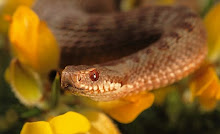GlosARG
If you are not already aware, along with a good friend Scott Passmore I have founded Gloucestershire's very own Reptile and Amphibian Conservation Group. This group is only a couple of weeks old yet we have already discovered a new colony of Great Crested Newts living in an old, secluded pond deep in the Forest of Dean.
A great start to our new venture and we hope for many more discoveries in the years to come.
If you live in the Gloucestershire area and want to help us by becoming involved. Please visit our website, Facebook page or even Twitter. You can contact us on all of these pages and we will be delighted to sign you up!
I have been finding, surveying and managing areas for the adder and grass snake for years. In turn this helps other reptiles and amphibians in the area. I have a wealth of experience and I would be delighted to pass this on to the right people so that together, we can make Gloucestershire a recognised place where Reptile and Amphibian Conservation is concerned.
See links under adder pic.
 |
| Female Adder |
____________________________________________________
Now for Some Deer
These two chaps (Fallow Deer Bucks) were having a lazy stroll through the foxgloves and the more I observed them, the more I noticed some peculiar behaviour.
When fallow deer breed the buck will bite the back of the doe, like what you can see in the photograph below, so either this chap was getting a little frisky, or he was just getting some practice in for the big day?
Their antlers are still in the early stages of growth and are covered in velvet at this time of the year, but over the next couple of months the antlers you see here will grow to a massive size and during the month of September they will rub the velvet off on trees surrounding their breeding territory.
If you look at the two front points of the antler, which are growing out to protect the eyes during a fight you will notice that they are quite long. This indicates that when fully grown, these two chaps will have some pretty impressive palmate antlers.
They may look firm friends now, but come September/October, they will be bitter rivals and will even fight for the right to mate with the doe's in this area.
As long as they do not move to a different part of the forest, I will do my best to find and photograph these two chaps as their antlers grow and the rutting season commences.
Rob















